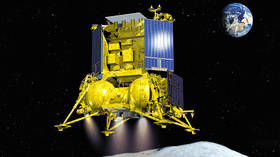‘Most important’ scientific mission for Russia in 2022 named

The launch of the ground-breaking Luna 25 moon lander mission is set to become the most important milestone for Russian science this year, the president of the country’s Academy of Sciences Alexander Sergeyev has said.
He expressed confidence that the state-of-the-art spacecraft would make a “soft and successful” historic first landing in the lunar south pole region, which offers the highest chances of finding water.
“The launch of the Luna 25 lander is the most important Russian scientific event in 2022 and it marks our return to the Earth’s natural satellite since the 1970s,” Sergeyev told TASS News agency, adding that the summer of 2022 would be the most favorable time for the long-awaited mission.
“Water is fundamentally important for the exploration of the Moon, because the future lunar settlements are unlikely to experience any major issues with energy, but oxygen is something that needs to be obtained,” the Academy’s president said.
The Russian space agency Roscosmos’ Luna 25 lander, previously known as Luna-Glob, is currently scheduled to launch from the Vostochny Cosmodrome in July 2022 on a Soyuz-2.1b rocket with a Fregat upper stage. Its concept dates back to the Soviet Luna program.
Luna 25 will land near the lunar south pole at the Boguslavsky crater.
Roscosmos has high hopes for the mission, which is not only set to become “an important step in space exploration” but will also allow a view “from a different angle” at the perspectives of space exploration and will contribute to a better understanding of the “mechanisms of the planets’ genesis, the appearance of water and, consequently, of life on Earth.”
The global race to explore the moon has intensified in recent years. NASA is aiming to launch the first test flight of its own moon rocket in March, the Space Launch System with an Orion capsule, and to resume human landings in 2025. Meanwhile, China has successfully launched a series of lunar missions in recent years and India is planning to launch the Chandrayaan-3 lander mission this year.












